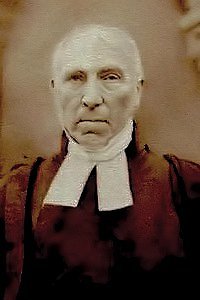Introduction
Born: August 17, 1780, Dublin, Ireland.
Died: November 24, 1860, Holborn, England.
Buried: St. Stephen Walbrook, London, England.

Born: August 17, 1780, Dublin, Ireland.
Died: November 24, 1860, Holborn, England.
Buried: St. Stephen Walbrook, London, England.

Croly graduated from the University of Dublin (MA 1804, LLD 1831), then took Holy Orders.
He worked in Ireland until about 1810, when he moved to London and devoted himself to literature.
In 1835, he became associated with St. Stephen’s, Walbrook, and St. Benet Sherehog. In addition to contributing to Blackwood’s Magazine, his prose writings were numerous, and dealt with biographical, historical, and scriptural subjects.
The subject of the following hymn is from the well known passage of Tacitus.George Croly, 1851:Evenerant prodigia, quæ neque hostiis neque votis piare fas habet gens superstitioni obnoxia, religionibus adversa.
Visæ per cœlum concurrere acies, rutilantia arma et subito nubium igne conlucere templum. Expassæ repente delubri fores, et audita maior humana vox
Excedere Deos.Simul ingens motus excedentium.Tacitus, Book V
Flow on, for Zion—flow, my tears—
Thou sepulcher of sepulchers
Thy glory but a gorgeous dream,
Thy strength, a wasted summer stream;
Thy turban cloven on the ground,
With all its jewels scattered round.
Age upon age, Captivity
Sits brooding on thy leafless tree;
And where its branching glory stood,
Is shame, and agony, and blood.
From morn to eve, Rome’s iron tide
Had dashed on Zion’s haughty side;
From morn to eve, the arrowy shower
Rained on her ranks from wall and tower.
Now rose the shout of Israel;
Now, like the sea’s returning swell,
Rushed up the Mount the Roman charge,
Again beat back by Judah’s targe;
Strewing with helm and shield the hill;
All wearied, but th’unconquered will.
’Twas eve, and still was fought the field,
Where none could win, and none would yield;
Beneath the twilight’s deepening shade
Echoed the clash of blade on blade.
Still rushing through the living cloud,
Its path the Lion-banner ploughed;
And still the Eagle’s fiery wing
Seemed from the living cloud to spring;
Till Rome’s retiring trump was blown,
Answered by shouts from Zion’s throne.
That day the Roman learned to feel
The biting of the Jewish steel.
’Twas night. The sounds of earth were hushed,
Save where the palace-fountains gushed;
Or from the myrtle-breathing vale,
Sung, to the stars, the nightingale.
Splendid the scene, and sweet the hour!
The moonbeam silvered tent and tower,
Touched into beauty grove and rill,
And crowned with luster Zion’s hill.
All loveliness, but where the gaze
Shrank from the Roman camp-fire’s blaze;
All peaceful beauty, but where frowned,
Omen of woe, the Roman Mound!*
’Twas midnight; ceased the heavy jar
Of rampart-chain and portal-bar;
That hour of doom, on Zion’s wall
No warrior’s foot was heard to fall;
No murmur of the mighty camp,
No cohort’s tread, no charger’s champ,
Gave sign that Earth was living still;
All hushed, as by a mightier Will;
Ev’n wounds that wring, and eyes that weep,
Were bound in one resistless sleep:
Silence of silence, all around;
Hushed as the grave—a death of sound!
What visioned forms, like things of dreams,
Or like the Pole’s phosphoric streams,
Or the wan clouds of winter’s even,
Now marshal on the fields of Heaven,
There gleam, in clouds of spectral light,
The Camp, the Mound, th’embattled height;
There moves the Legion’s brazen line;
Ill-omened Israel, where is thine?
Rolls up the visioned Mount the charge;
But where the turban and the targe?
The cohort climbs the visioned tower,
Yet-sweeps its ranks no arrowy shower;
Pale flames from visioned altars rise;
Israel, art thou the sacrifice!
But sudden roars the thunder-peal,
The forests on the mountains reel,
And, like the burst of mountain springs,
Is heard a rush of mighty wings!
And voices sweet of love and woe,
(Love, such as Spirits only know),
Swell from the Temple’s cloisters dim,
A mingled chant of dirge and hymn;
Like grief, when help and hope have fled,
Like anguish o’er the dying bed;
Like pulses of a breaking heart:
We must depart, we must depart.
And grandly o’er Moriah’s height,
Encanopied in living light,
Rose to that chant of dirge and hymn
The squadrons of the Seraphim.
From Carmel’s shore to Hebron’s chain,
Shone in that splendor hill and plain;
Still starlike seemed the orb to soar,
Then all was night, and sleep once more.
But whence has come that sudden flash,
And whence the shout, and whence the clash?
The Legions scale the Temple wall!
Its startled warriors fly or fall.
Now swells the carnage, wild and wide;
Now dies the bridegroom by the bride;
Peasant and noble, parent, child,
In heaps of quivering carnage piled;
On golden roof, on cedar floor,
Still flames the torch, still flows the gore;
Hour of consummate agony,
When nations, God-deserted, die!
Yet still the native dirk and knife
Wrung blood for blood, and life for life.
The priest, as to the Veil he clung,
With dying hand the javelin flung;
The peasant on the Roman sprang,
Armed but with panther’s foot and fang,
From his strong grasp the falchion tore,
And dyed it in the robber’s gore.
That night who fought, that night who fell,
No eye might see, no tongue might tell;
That sanguine record must be read
But when the grave gives up its dead;
Then Judah’s heart of pride was tame;
The rest was sorrow, slavery, shame!
George Croly
Scenes from Scripture, 1851
* The Romans surrounded the city with a trench and a mound, which prevented all escape, and formed a characteristic of the siege.